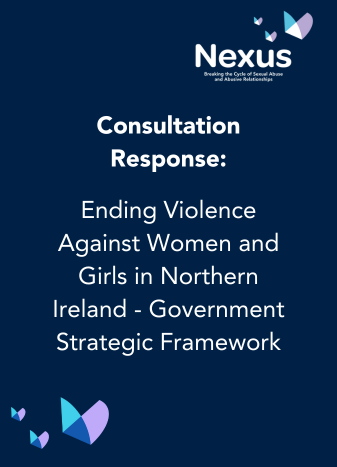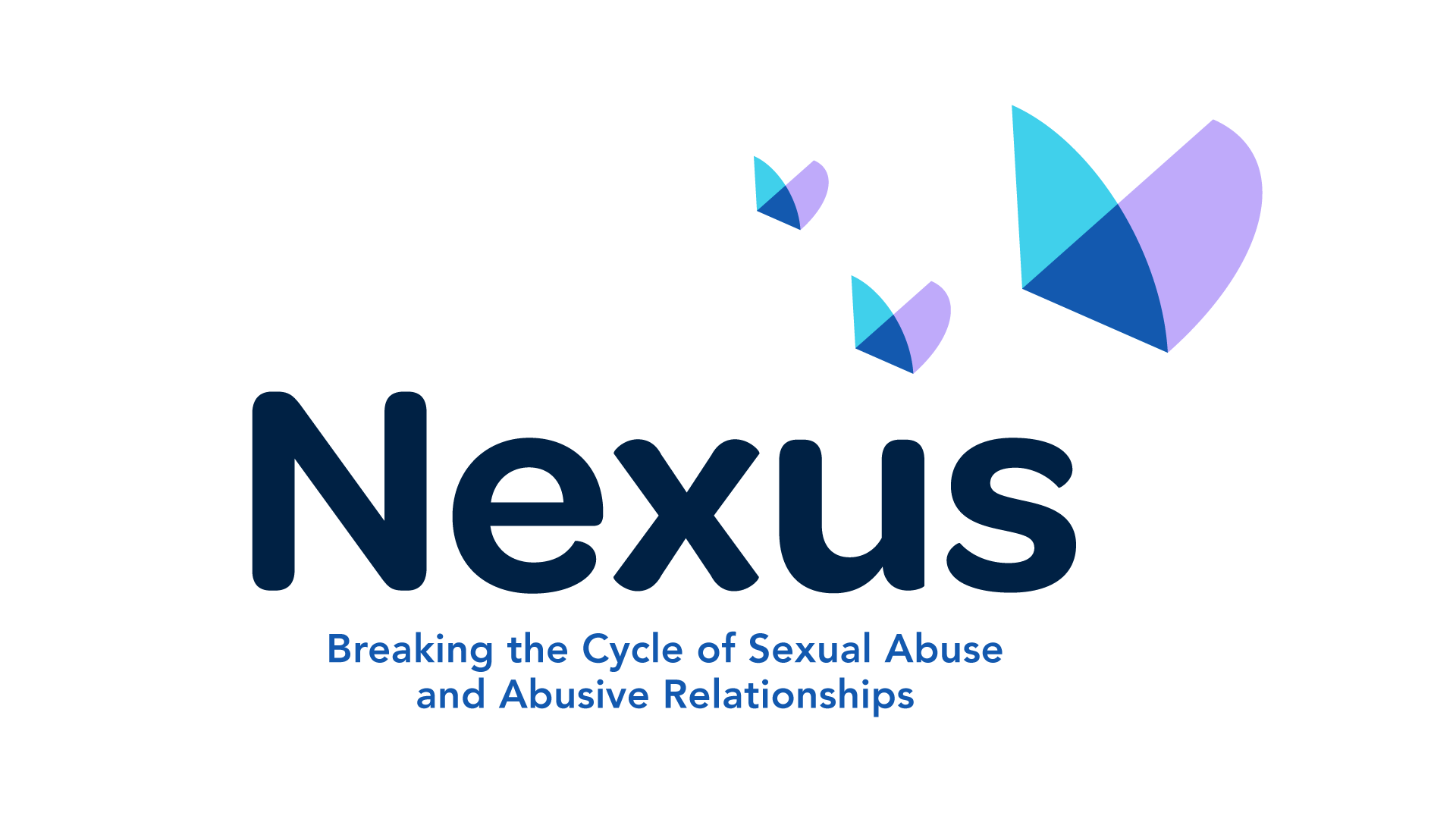Nexus Response
Ending Violence Against Women and Girls in Northern Ireland – Government Strategic Framework Consultation
Nexus Response
Ending Violence Against Women and Girls in Northern Ireland – Government Strategic Framework Consultation
#BreakTheCycle
Nexus Consultation Response:
Ending Violence Against Women and Girls in Northern Ireland – Government Strategic Framework Consultation
We at Nexus welcome the Draft Strategic Framework to End Violence Against Women and Girls, in Northern Ireland.
Currently Northern Ireland is the only jurisdiction within the UK and Ireland without a strategic framework and operational plan to end violence against women and girls despite the high prevalence rates reported. Therefore, we recognise the commitment of the Northern Ireland Executive in mandating its development.
Nexus is proud to have played a role in shaping the Draft Strategy and Foundational Action Plan as part of the co-design team. This opportunity allowed us to amplify the voices of our service users and contribute our professional expertise to help craft the framework’s ambitions and key priorities.
Ending all forms of gender-based violence is a key priority for Nexus as the cultural, legal, economic and political drivers that contribute to it also enable the perpetuation of sexual abuse and abusive relationships. We recognise that eliminating these drivers requires a whole societal approach, meaning we can all play our part.
You can find key highlights from our response below. You can find the strategic framework here.
The Vision: “A changed society where women and girls are free from all forms of gender-based violence, abuse and harm including the attitudes, systems and structural inequalities that cause them.”
We wholeheartedly endorse the vision, it acknowledges the complex interplay of factors that perpetuate violence and aligns with our belief in a ‘whole society’ approach.
Outcome 1: “Changed Attitudes, Behaviours and Social Norms. Everyone in society understands what violence against women and girls is, including its root causes, and play an active role in preventing it.”
We support Outcome 1’s emphasis on raising awareness, prevention, and understanding the root causes of VAWG. However, we urge for a broader perspective that includes the role of policymakers, key organisations, sectors, and community engagement to create a more comprehensive solution.
Outcome 2: Healthy, Respectful Relationships. Everyone in society is equipped and empowered to enjoy healthy, respectful relationships.
While we appreciate the positive approach of Outcome 2, focusing on healthy relationships, we recommend a stronger emphasis on the role of the private sector and government organisations in promoting/funding early education and workplace initiatives. Additionally, we advocate for a comprehensive mapping exercise to identify needs across Northern Ireland, including services for potential offenders to break the cycle of abuse.

Outcome 3: Women and Girls Are Safe and Feel Safe Everywhere. Organisations and institutions across government and society embed the prevention of violence against women and girls in all that they do so that women and girls are safe and feel safe everywhere
While we agree with Outcome 3’s recognition of violence against women and girls occurring everywhere, we propose a stronger emphasis on sectors beyond the community and voluntary sector, such as the private sector, schools, and religious institutions. These sectors should play a pivotal role in creating safe environments, mitigating risk, and ensuring confidentiality.
Outcome 4: “Quality Frontline Services, Protection, and Provision for Victims and Survivors of Violence Against Women and Girls. Provision of high-quality services for women and girls who are victims and survivors of violence against women and girls”
We are in agreement with Outcome 4’s focus on providing high-quality services for victims and survivors. However, we advocate for consistent and fully funded services and an integrated, multi-disciplinary approach to prevent re-traumatisation of victims who require multiple services.
Outcome 5: “A Justice System which has the Confidence of Victims, Survivors and the Public in its Ability to Address Violence Against Women and Girls, – In the context of violence against women and girls, a system that considers and addresses the needs of people who come into contact with it, holds perpetrators to account, while challenging and supporting them to change, gives victims and survivors a voice and a place in the process, and has the confidence of the public.
We support Outcome 5’s commitment to addressing the needs of individuals within the justice system, and we are encouraged by the inclusion of rehabilitative services as well as the role for victims and survivors in the judicial process. However, we urge for more detailed plans regarding data capture for case attritition, evaluation of perpetrator programs, and improvements to understanding of and accessibility to the courts.
Outcome 6: All of Government and Society Working Better Together to End Violence Against Women and Girls. A whole system approach with collaboration and cooperation by default across government departments and with, within and between the community, voluntary and other sectors.”
We strongly endorse Outcome 6’s call for a collaborative, integrated approach across government departments and sectors. However, we emphasise the need to explore the role of the private sector, need for consistent funding in the third sector and stress the importance of mandatory data capture and evaluation.
Prevention: The overall emphasis of the Strategic Framework is on prevention, tackling the root causes, and stopping the violence before it starts.
We firmly support the prevention-focused approach, addressing the underlying causes of VAWG to stop it before it occurs. Early intervention and prevention services are crucial in creating a society free from abuse and harm.
Action Plan: Right Actions for a Changing Landscape
We affirm the actions outlined in the Foundational Action Plan, provided they remain consistent and adaptable to emerging trends and research on VAWG and experiences of it.
Equality Impact Assessment (EQIA) and Further Considerations
While commending the transparency of the EQIA, we highlight the need for further focus on intersectional issues related to homelessness, aging, and various cultural norms. Questions regarding the hardest-to-reach groups, women perpetrators, non-English speakers, people who have been trafficked and individuals with learning difficulties should be addressed. A clear yearly review process and coordinated reporting across society are essential, and decisions about appropriate review timeframes and data quality should be made with inclusivity and transparency in mind.
The Vision: “A changed society where women and girls are free from all forms of gender-based violence, abuse and harm including the attitudes, systems and structural inequalities that cause them.”
We wholeheartedly endorse the vision, it acknowledges the complex interplay of factors that perpetuate violence and aligns with our belief in a ‘whole society’ approach.
Outcome 1: “Changed Attitudes, Behaviours and Social Norms. Everyone in society understands what violence against women and girls is, including its root causes, and play an active role in preventing it.”
We support Outcome 1’s emphasis on raising awareness, prevention, and understanding the root causes of VAWG. However, we urge for a broader perspective that includes the role of policymakers, key organisations, sectors, and community engagement to create a more comprehensive solution.
Outcome 2: Healthy, Respectful Relationships. Everyone in society is equipped and empowered to enjoy healthy, respectful relationships.
While we appreciate the positive approach of Outcome 2, focusing on healthy relationships, we recommend a stronger emphasis on the role of the private sector and government organisations in promoting/funding early education and workplace initiatives. Additionally, we advocate for a comprehensive mapping exercise to identify needs across Northern Ireland, including services for potential offenders to break the cycle of abuse.
Outcome 3: Women and Girls Are Safe and Feel Safe Everywhere. Organisations and institutions across government and society embed the prevention of violence against women and girls in all that they do so that women and girls are safe and feel safe everywhere
While we agree with Outcome 3’s recognition of violence against women and girls occurring everywhere, we propose a stronger emphasis on sectors beyond the community and voluntary sector, such as the private sector, schools, and religious institutions. These sectors should play a pivotal role in creating safe environments, mitigating risk, and ensuring confidentiality.
Outcome 4: “Quality Frontline Services, Protection, and Provision for Victims and Survivors of Violence Against Women and Girls. Provision of high-quality services for women and girls who are victims and survivors of violence against women and girls”
We are in agreement with Outcome 4’s focus on providing high-quality services for victims and survivors. However, we advocate for consistent and fully funded services and an integrated, multi-disciplinary approach to prevent re-traumatisation of victims who require multiple services.
Outcome 5: “A Justice System which has the Confidence of Victims, Survivors and the Public in its Ability to Address Violence Against Women and Girls, – In the context of violence against women and girls, a system that considers and addresses the needs of people who come into contact with it, holds perpetrators to account, while challenging and supporting them to change, gives victims and survivors a voice and a place in the process, and has the confidence of the public.
We support Outcome 5’s commitment to addressing the needs of individuals within the justice system, and we are encouraged by the inclusion of rehabilitative services as well as the role for victims and survivors in the judicial process. However, we urge for more detailed plans regarding data capture for case attritition, evaluation of perpetrator programs, and improvements to understanding of and accessibility to the courts.
Outcome 6: All of Government and Society Working Better Together to End Violence Against Women and Girls. A whole system approach with collaboration and cooperation by default across government departments and with, within and between the community, voluntary and other sectors.”
We strongly endorse Outcome 6’s call for a collaborative, integrated approach across government departments and sectors. However, we emphasise the need to explore the role of the private sector, need for consistent funding in the third sector and stress the importance of mandatory data capture and evaluation.

Prevention: The overall emphasis of the Strategic Framework is on prevention, tackling the root causes, and stopping the violence before it starts.
We firmly support the prevention-focused approach, addressing the underlying causes of VAWG to stop it before it occurs. Early intervention and prevention services are crucial in creating a society free from abuse and harm.
Action Plan: Right Actions for a Changing Landscape
We affirm the actions outlined in the Foundational Action Plan,(link here again) provided they remain consistent and adaptable to emerging trends and research on VAWG and experiences of it.
Equality Impact Assessment (EQIA) and Further Considerations
While commending the transparency of the EQIA, we highlight the need for further focus on intersectional issues related to homelessness, aging, and various cultural norms. Questions regarding the hardest-to-reach groups, women perpetrators, non-English speakers, people who have been trafficked and individuals with learning difficulties should be addressed. A clear yearly review process and coordinated reporting across society are essential, and decisions about appropriate review timeframes and data quality should be made with inclusivity and transparency in mind.
If you have any queries about this consultation response, please contact communications@nexusni.org




